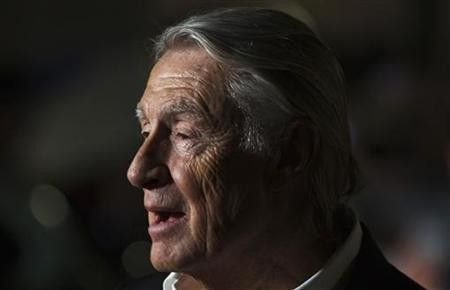A new 'Trespass' in Joel Schumacher's Film Career

In present-day Hollywood dominated by bland business executives and political correctness, the outspoken director Joel Schumacher stands as a refreshing throwback to an era when 'show' shared equal footing with business in 'showbiz'.
Schumacher started out as a costume designer for Woody Allen, then helped create The Brat Pack with such seminal hit films as The Lost Boys and St. Elmo's Fire, before going on to direct Batman Forever, The Client and Phone Booth.
Schumacher's latest film Trespass, due to hit theaters on Friday, is a tense, twisting thriller starring Oscar winners Nicholas Cage and Nicole Kidman as a wealthy couple facing the nightmare of a home invasion robbery.
The 72 year-old director spoke with Reuters about making the film, his long career and his own nightmares on set.
Q: You obviously love making thrillers like this: Phone Booth, 8mm and The Number 23. What's the secret to making a great one?
A: First, you need a great premise, and this has the primal fear we all have of someone breaking into your home in the middle of the night. Then you ratchet up the tension and hopefully keep everyone on the edge of their seats.
But I also like to make films with lots of layers, even if they're not readily apparent. So this is also about class warfare and the sorry state of the American dream today. In fact, I saw Nic Cage's character and the gang's leader as being two sides of the same coin. They've both over-reached for that dream and been foolish and landed in big trouble. It's what's happened in this country today. People had to have the big house, the jewelry, the paintings, and many were encouraged by our corrupt financial system, but simply couldn't afford it.
Q: You also like making films about flawed characters.
A: That's true. I've worked in a lot of genres, but I do like to take flawed people and then heap stress on them and see if it'll make 'em or break 'em.
Q: You've worked with both your stars before, Nic in 8mm, Nicole in Batman Forever. What did they bring to this film?
A: I've known Nicole since right after she did Dead Calm in '89, and I've been in love with her since then. She came to my house and was very shy but just stunning, and we became good friends. Same with Nic. I've know him since he was a teenager, and like Jim Carrey, he was always too special and quirky to put in my ensemble movies. They both do the thing they do better than anyone else, and they added a lot to their characters in the rehearsals and rewrites.
And this is the kind of movie, like 'Phone Booth,' you can't script it out. You get seven stressed-out people in a room and (things are) going to happen! No one's going to just stand there and recite their lines in turn. It doesn't work that way. There's a lot of overlapping dialogue, like a Robert Altman film. I was very influenced by him back in my heavy drug days in the late '60s. His approach was so revolutionary back then, and his use of ensemble casts.
Q: How do you look back on your career?
A: Hollywood was very different back then. It was a much smaller industry, and I knew all the studio heads by name even though I was the poorest person in the room. I started off making $200 a week doing costumes, and I was coming off my intravenous drug days, and I'd have worked for even $5. I grew up in Queens behind a movie theater, and I was always in love with movies and actors. I think I'm a very cast-dependent director, and I think I've had the career I've had because of my casts. I may not be a genius director, but I'll put my casts up against anyone's!
Q: What did you learn from Woody Allen?
A: The big lesson was, you must write in order to direct. So I did, and sold a lot of scripts like Car Wash, which they wouldn't let me direct. But it was a huge hit, and then I got a break and was offered my first feature, 'The Incredible Shrinking Woman.'
Q: You've made two dozen films. Any favorites?
A: No, they're like children -- all different, and you love them all equally. Sometimes the nightmare ones are the ones you learn most from. Looking back, I think I was the wrong director for 'Dying Young' with Julia Roberts. I'd just done 'Flatliners' with her and was mad about her. Still am. But I don't think I'm the greatest love story director, and it was also a very veiled movie about AIDS. We talked about that a lot. It was a difficult project.
Q: What about difficult stars. Ever had a nightmare experience?
A: There's a couple I'd never work with again. Val Kilmer, though he was a fabulous Batman -- sexy, dark, great. His reputation preceded him. And I wasn't alone. Even Ron Howard came out about him, which really surprised me as he's much more of a gentleman than I am! I haven't really seen Val since back then, and don't know what's happened to his life since then. I hope I've grown, I hope he's grown. That's another great thing Woody Allen taught me. He said to me back in '73: 'Success gives people permission to be exactly who they were always supposed to be; the good get better, and the worst get worser.' I've never forgotten that, and it's so true!
© Copyright Thomson Reuters {{Year}}. All rights reserved.





















